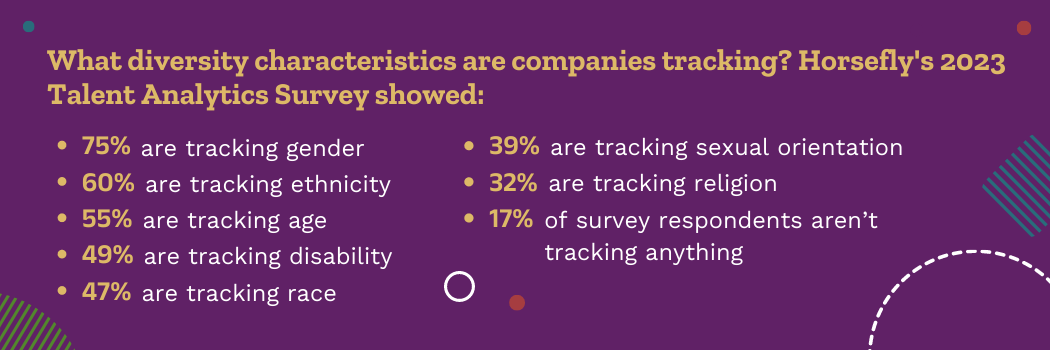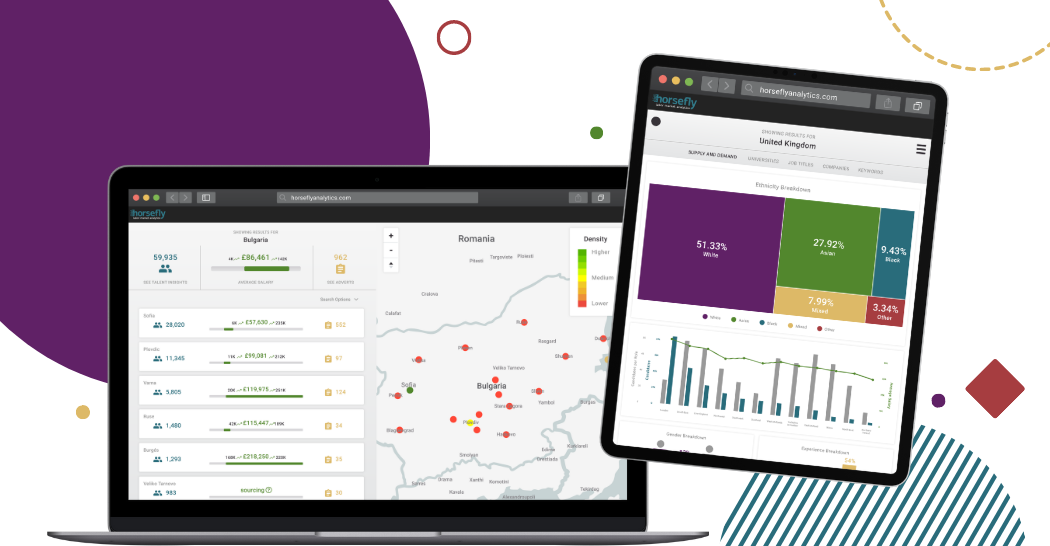A 2023 Survey conducted by Horsefly Analytics showed that 60% of companies are currently tracking diversity metrics across their organization. Understanding diversity and demographical data has become increasingly important in the business world. With more and more companies striving to become representatives of their customers, understanding this information can be a valuable asset for both employers and employees.
Currently, 3 in 4 job seekers and workers prefer diverse companies. So, it’s essential to recognize how various factors that affect demographics, like age, gender identity, race, religion, and culture, play into societal makeup.
Companies can use these insights to create an environment that strives for multiple perspectives on equal footing. Continue reading for more insights on empowering your data to empower your people.

Understanding Diversity & Demographic Data
Companies are harnessing the power of data to ensure they attract and employ a diverse group of individuals. In today's globalized marketplace, diversity is no longer just a buzzword but a necessity for businesses looking to thrive.
However, diversity is not just about hiring people of different backgrounds but also ensuring equal representation and opportunities at all levels of the organization. This is where diversity analytics and data come in. By collecting and analyzing ethnicity breakdowns for any set of skills and job titles, businesses can better understand their workforce composition and identify areas for improvement.
For example, if a company has a workforce predominantly of one ethnicity, it may indicate a bias in recruitment or advancement practices. By having accurate ethnicity breakdowns for any position, businesses can benchmark their diversity metrics against industry standards and identify areas where they are lagging. This can help drive the development of new policies and initiatives aimed at attracting and retaining a more diverse workforce.
In addition, diversity data can also be used to establish accountability and measure the effectiveness of diversity initiatives over time, providing a roadmap for continuous improvement. Therefore, up-to-date ethnicity breakdowns are essential for businesses looking to create a culture of inclusion and drive long-term growth.
Diversity Analytics & Data
Horsefly Analytics provides up-to-date ethnicity breakdowns for skills and job titles – in most locations worldwide.
- View the accurate ethnicity breakdown for any position. This matters when creating new KPIs within your Talent and Workforce Planning functions. If you’re tasked with hiring Hispanic female mechanical engineers and there is no representation in the area in which you’re recruiting, it’s far better to know that before DEI benchmarks are set in stone.
- Set appropriate business benchmarks. If your company plans to open a new regional office in an area that doesn’t have the talent you need OR with competition recruiting outside your compensation bands, that will impact your budgets for years to come.
- Quickly assemble insightful reports and dashboards that drive performance. Understanding the demographic makeup of potential workforce and competition can help create performance benchmarks and expectations faster than lengthy reports ever could.
Using Technology to Reduce Bias
Pursuing diversity and inclusivity in the workplace is a top priority for many modern organizations. Yet, despite efforts to address societal biases, unconscious prejudices can sometimes find their way into the recruitment process. Fortunately, technology can be leveraged to help reduce bias and ensure equal opportunity for all applicants.
For example, leveraging the data in your Applicant Tracking System (ATS), which records employee and candidate information, can yield a wealth of information to help make your workplace and talent acquisition process more inclusive. By analyzing this data, hiring managers can identify potential areas of bias in the recruitment process and make conscious efforts to mitigate them. The result is a fairer, more inclusive hiring process that gives every applicant an equal chance to succeed.

Download the full 2023 Talent Analytics Survey Results
In addition to tracking data, many ATS systems offer anonymized applications and shortlisting features. Anonymization removes any identifying information from an applicant's profile, such as their name or email address, which could potentially reveal their gender, race, or ethnicity. Shortlisting, meanwhile, enables hiring managers to narrow down applicant pools based solely on relevant job qualifications and experience, removing unconscious biases from the equation.
Phone screening may also be used initially to minimize visual and unconscious bias when selecting candidates. Such a system could be tailored according to each organization's specific needs, allowing them to reduce bias while still finding the best fit for any given role. By leveraging technology in this way, employers will benefit from increased efficiency in their recruitment processes while also ensuring they give every candidate a fair opportunity.
What the Future of Data Shows
Businesses have much to gain from recognizing the importance of a diverse workforce - and data can guide them in achieving that goal. By taking advantage of diversity information, employers can identify areas for improvement and create an atmosphere where all demographics are equally represented. This opens up new opportunities and bolsters creativity, innovation, and morale within organizations! That’s why companies like Horsefly Analytics are equipped with the right tools to help companies empower their data and staff and achieve their DE&I goals.
Did you know? Diverse management has been shown to increase revenue by 19%.
Additionally, diversity data helps companies understand how their performance compares with other organizations in the same industry and what areas need further attention. With this valuable insight into their workforce composition, companies can make targeted changes to create a more inclusive culture, promote higher levels of engagement amongst staff, and foster healthy working relationships between individuals from different backgrounds. As companies recognize the business value of having a diverse and equitable workplace, they use diversity data as part of their long-term strategy for success.
In today's dynamic work environment, diversity, and equitable recruitment strategies have become critical to an organization's success. Companies that understand and support underrepresented groups can foster an inclusive, innovative, and high-performing work environment. It is paramount that businesses take meaningful and decisive steps toward identifying which underrepresented groups need more support and develop concrete action plans to ensure a more diverse and equitable workforce.
In the competitive recruitment landscape, organizations need help to meet the demands of today's rapidly changing workforce. The Talent and Labor Analytics Survey Results Ebook will guide your organization through the process. Download your copy below to get started!
Download the full 2023 Talent Analytics Survey Results

